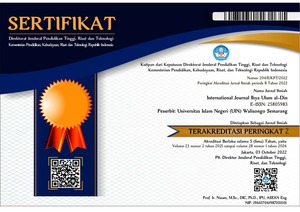Legal Implications of Marriage During the 'Iddah Period: Analytical Study of the Opinions of Fiqh Scholars
DOI:
https://doi.org/10.21580/ihya.26.1.20519Keywords:
Divorce, 'Iddah, Legal Implication, CancelledAbstract
Divorce between a man and a woman, whether due to death, divorce, or a court decision, results in the application of the law of 'iddah (a waiting period) in Islam. Compilation of Indonesian Islamic Law (KHI) Chapter VI Article 40 letter b concerning the Prohibition of Marriage, that it is prohibited to enter into a marriage if a woman is still in the 'iddah period with another man. This marriage prohibition applies to both men and women simultaneously.'Iddah is a stipulation of Allah's Shari'a for women who have broken up with their marital relationship to carry out the waiting not to get married at a certain time to hifdz an-nail that guarantees the honor of the child's lineage in the family so that by 'iddah the woman's womb is clean from pregnancy and the most basic goal of ‘iddah is for ta'abbudi. So, based on ta’abbbudi, the law of carrying out 'iddah is obligatory and sinful for those who break it, both men and women. So, The legal implications for those who marry during the 'iddah period, either iddah due to death or divorce for both men and women who have or have not had sexual intercourse, are that marriage is broken (faced) and must be annulled, and if they have had sexual relation, both of them' you have committed adultery and sinned, even according to Imam Malik because of sexual intercourse, it is haram for a husband who marries a woman during 'iddah to remarry that woman forever. Jumhur ulama allows both men, whether the first husband who divorced her or the second husband who marries a woman during the 'iddah period, to remarry her on condition that the woman has carried out her two periods of 'iddah perfectly, furthermore allowed to marry the man she chose.
Downloads
References
Abdul Karim bin Muhammad ibn Abdul Karim, A. a.-R.-Q. (2017). al-Aziz Syarh al-Wajiz. Lebanon: Dar al-Kutub al-Ilmiyah.
Abdullah ibn Ahmad ibn Muhammad ibn Qudamah, A. M. (1998). Al Fiqh Ala Madzahib Al-Arba'ah. Beirut : Dar Al-Qolam.
Al-dimasqy, T. i.-h. (2013). Kifayat al-Akhyar. Semarang: Putra Toha.
Alfiyatul Rizqiyah, A. R. (2022). Pelanggaran Terhadap Pelaksanaan Masa ‘Iddah Ditinjau Dari Perspektif Hukum Keluarga Islam (Studi Kasus Di Desa Benda Kecamatan Sirampog Kabupaten Brebes). Khuluqiyya: Jurnal Kajian Hukum Dan Studi Islam, 04(1), 1–17. https://doi.org/10.56593/khuluqiyya.v4i1.76.
al-Ghundur, A. (2016). Al-Thalaq al-syari'at al-Islamiyah wa al-Qanun. Egypt: Dar-al-ma'arif.
Al-Jaziri, A. i. (2003). Al-Fiqh Ala Madzahib Al-Arba'ah. Beirut: Dar Al Kutub Al-Ilmiyah.
al-Jaziri, A. i. (2018). al-Fiqh ala Madzahib al-Arba’ah. Beirut: Dar al-Kutub al-Ilmiyah.
al-Qurtuby, Y. i. (2014). Al-Istidzkar. Beirut: Dar al-Kutub al-Ilmiyah.
Al-Razi, F. (2019). Mafatih al-Ghaib. Beirut: Dar Ihya al-Turats al-Arabi,.
al-Syaikhani, M. i. (1994). Nailul-Authar. Egypt: dar al-hadith.
al-Syairazy, A. I. (1991). Majmu Syarh al-Muhazzab. Cairo: Idarat al-Thabi'ah al-Muniriyah.
al-Tirmidzi, A. I.-D. (2014). Sunan At-Tirmidzi. Beirut: Darrul Mustafa.
Amir Syarifudin. (2014). Hukum Perkawinan Islam di Indonesia : Antara Fiqh Munakahat dan Undang -undang Perkawinan. Dalam Hukum Perkawinan Islam di Indonesia : Antara Fiqh Munakahat dan Undang -undang Perkawinan (hal. 197). Jakarta: Kencana.
Anas, M. i. (1961). Al-Muwaththa'. Beirut: Dar Al-Fikri.
an-Naisaburi, A. a.-H.-H.-Q. (1955). Shahih Muslim. Cairo: Isa al-baby al-halaby.
asSegaf, S. A. (2016). al-fiqh ala madzahib al-arba'ah. Beirut: Dar el-fikr.
Az-Zuhaili, W. b. (2018). al-Fiqh al-Islamiy wa Adillatuhu. Damascus: Dar al-fikr.
Dahlan, A. A. (2015). Ensiklopedi Hukum Islam. Jakarta: Ichtiar Van Hoeve.
Hidayat, R. E. (2018). Pendapat Imam Mazhab Tentang Hak Istri Pada Masa Iddah Talak Ba’in Dan Relevansinya Dengan Undang-Undang Perkawinan Di Indonesia. Istinbath : Jurnal Hukum, 15(1), 145. https://doi.org/10.32332/istinbath.v15i1.1123.
H. Saubari, M. (2020, 12 Senin). https://kalsel.kemenag.go.id/opini/704/Fenomena-Pelanggaran. Diambil kembali dari https://kalsel.kemenag.go.id/opini/704/Fenomena-Pelanggaran: https://kalsel.kemenag.go.id/opini/704/Fenomena-Pelanggaran
Jauharatun, J. (2017). Hukum Pernikahan Janda Dalam Masa ‘Iddah Menurut Pandangan Ulama Palangka Raya. Jurnal Studi Agama Dan Masyarakat, 12(2), 158. https://doi.org/10.23971/jsam.v12i2.555.
Maulida, F., & Busyro, B. (2018). NAFKAH IDDAH AKIBAT TALAK BA`IN DALAM PERSPEKTIF KEADILAN GENDER (Analisis Terhadap Hukum Perkawinan Indonesia). ALHURRIYAH: Jurnal Hukum Islam (ALHURRIYAH JOURNAL OF ISLAMIC LAW), 3(2), 113. https://doi.org/10.30983/alhurriyah.v3i2.720.
Muhammad ibn Jarir al-Thabary, J.-b. f.-M.-T.-T. (2009). Tafsir al-Misbah. Jakarta : Lentera Hati.
Mustafa Al-khin. (1992). Mustafa al-bugha et al, al-Fiqh al-Manhaji ala madzhab al-Imam al-Syafi'i. Damaskus: Dar al-Qalam.
Mustafa al-Khin, M. a.-B. (1992). Al-Fiqh al-Manhaji ala Madzhab al-Imam al-Syafi'i. Dalam Al-Fiqh al-Manhaji ala Madzhab al-Imam al-Syafi'i (hal. 125). Damaskus: Dar Al-Qalam.
Mu’alimah, K. R. (2015). Pembatalan Perkawinan Dengan Alasan Perkawinan Dilakukan Ketika Isteri Masih Dalam Masa ‘Iddah. 1–130.
Salim, S. A.-S. (2017). Panduan beribadah khusus wanita (menjalankan ibadah sesuai tuntunan Al Qur'an dan as-Sunnah. Jakarta: Almahira.
Saputra, A. R. (2015). Indikator Terjadinya Pernikahan dalam masa ‘Iddah. El-Usrah, 17-35.
Shihab, M. Q. (2009). Tafsir al-Misbah: Messages, Impressions and Harmony of the Qur'an. Jakarta: Lantern Day.
Syuhud, H. (2017). Sanksi pernikahan pada masa ‘iddah:studi terhadap pemikiran para imam al-madzahib al-arba’ah. al-Istidlal, 145-148.
Downloads
Published
How to Cite
Issue
Section
License
By submitting an article to the journal, the author(s) agree to transfer the published article's copyright to the journal, which will act as the publisher. This means the journal will have the right to publish the article in various forms, including reprints. The journal will maintain the publishing rights to the published articles.
This work is licensed under Creative Commons Attribution-ShareAlike 4.0 International License.
In line with the license, authors and third parties (readers, researchers, and others) are allowed to share and adapt the material. In addition, the material must be given appropriate credit, provided with a link to the license, and indicated if changes were made. If authors remix, transform or build upon the material, authors must distribute their contributions under the same license as the original.



